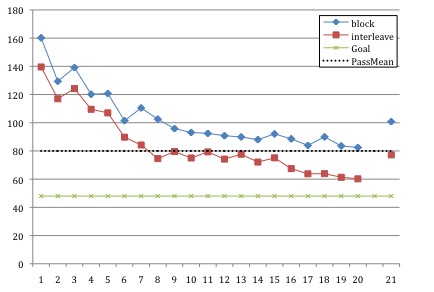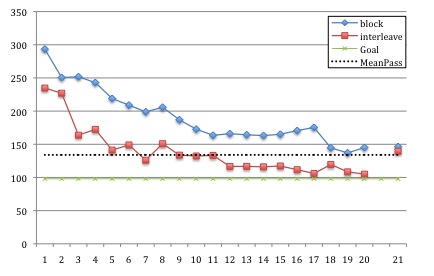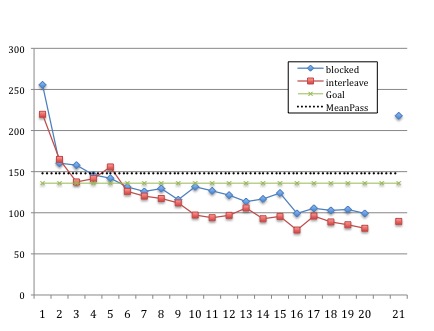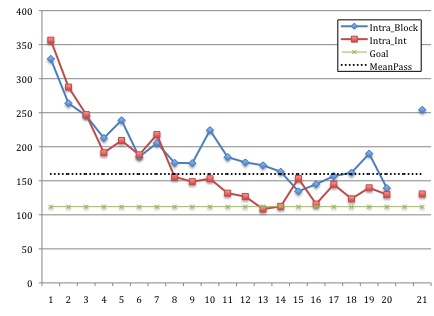Steven B Goldin, MD, PhD, Gregory T Horn, BA, Michael J Schnaus, BA, Mark Grichanik, BA, Adam Ducey, BA, Charles Nofsinger, MD, David Hernandez, MD, Murray Shames, MD, Mark Zakaria, MD, Michael T Brannick, PhD. University of South Florida.
Introduction: Fundamentals of laparoscopic surgery (FLS) certification is required for general surgery. FLS training requires a significant time commitment from residents to master the FLS skills. The recommended practice for learning FLS, as stated on the FLS website and in other papers, is to practice tasks one at a time until proficient (blocked practice). Learning theory suggests that interleaved practice, a method in which tasks are rotated rather than learned one at a time, may result in superior learning.
Method: Residents in general surgery, orthopedic surgery, and OB/GYN at USF Morsani College of Medicine were randomized into one of two groups: blocked practice (with a pattern of practice of AABBCCDD) or interleaved practice (with a pattern of practice of ABCDABCD). We compared the performance of residents across groups over 20 trials of each of four FLS tasks (peg transfer, pattern cut, extracorporeal suture, intracorporeal suture). Four weeks later, participants returned to the lab and completed two additional trials of each of the four tasks, in order to assess for longer-term retention of skill.
Results: Performance on each of the tasks, as measured by time to complete a task, improved with increased practice. The interleaved group showed significantly better performance during the learning process, and it showed better performance (but not always significantly so) on retention (Images 1-4). Standardized mean differences in favor of the interleaved group were substantial both at the end of practice and at follow-up (table 1).
Conclusion: Interleaved practice appears to have advantages over blocked practice in developing and retaining FLS skills. Furthermore, in 3 out of 4 of the tasks (peg transfer, extra corporeal, and intracorporeal suturing), the mean retention of skill for the interleaved group was below the mean pass score of PGY-5 residents who passed the FLS exam in 2009-2010. Retention of skill was above the mean for the block group in all 4 tasks. These findings all point to a benefit of interleaved practicing over blocked practice when it comes to FLS preparation. We encourage others to experiment with the method to confirm our findings.
Image 1. Peg Transfer
Image 2. Pattern Cut
Image 3. Extracorporeal Suture
Image 4. Intracorporeal Suture
Table 1. Standardized mean difference (d) values comparing blocked and interleaved groups on final two (19,20) and follow-up (21,22) trials.
| Task | Trials 19,20 | Trials 21,22 |
| Peg Transfer | 12.28 | 0.99 |
| Pattern Cut | 1.36 | 0.22 |
| Extracorporeal Suture | 2.14 | 0.95 |
| Intracorporeal Suture | 1.95 | 0.88 |



